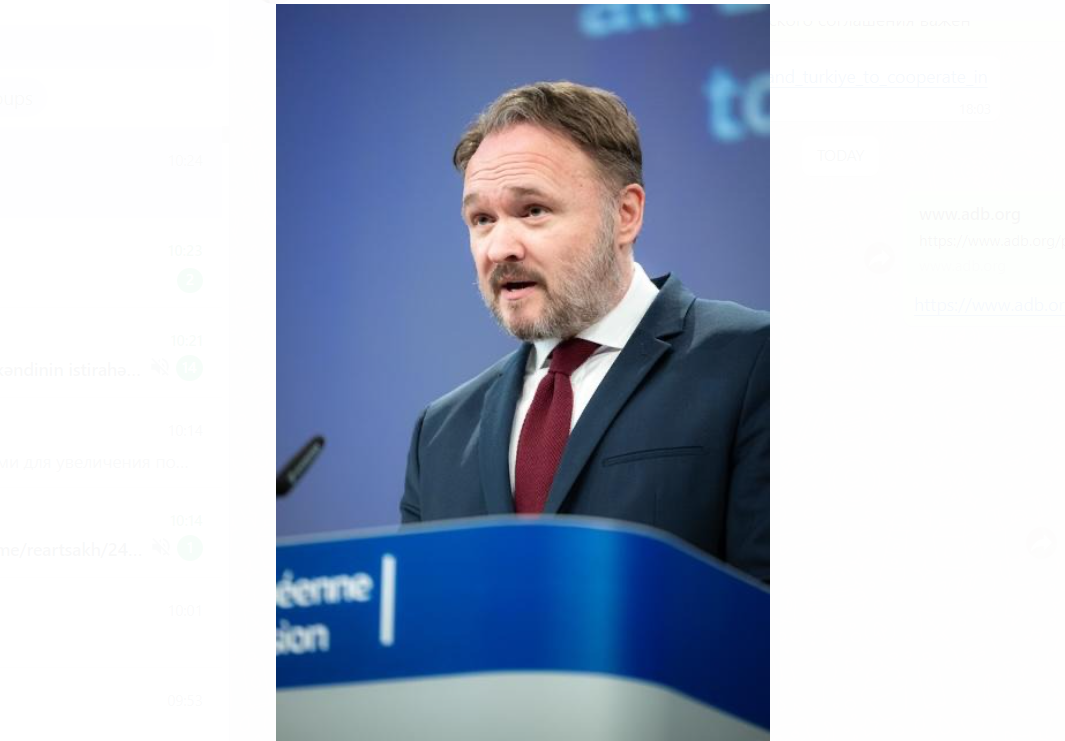BAKU, Azerbaijan, April 3. Solid progress is being made with implementation of projects to extend Azerbaijani gas reach within the European Union, European Commissioner for Energy and Housing, Dan Jørgensen said in an exclusive interview with Trend on the occasion of the Southern Gas Corridor Advisory Council’s meeting to be held in Baku April 4.
“The EU is working with partner countries to increase gas supplies through the Southern Gas Corridor. This is even more important as we aim to phase out our dependency on Russian fuels and diversify our energy supplies. The Southern Gas Corridor Advisory Council is an important platform where we track progress on these goals, ensure the operations of the Southern Gas Corridor, address energy security challenges, and work towards achieving net-zero emissions by mid-century,” he said.
Jørgensen pointed out that today, energy is even more a security matter.
“So we are committed to promoting renewable energy, energy
efficiency and renewable hydrogen and to explore options for a
regional green energy corridor in line with the objectives of our
Clean Industrial Deal and REPowerEUplans – which aim to phase out
our reliance on Russian fossil fuels.
Advancing the green agenda goes hand-in-hand with security of
supply. Energy efficiency and the expansion of renewable energy
reduce gas usage, and can hence be applied where it is most needed.
At the Advisory Council, we aim to strengthen mutual cooperation on
gas supply and demand, while discussing the necessary
infrastructure upgrades along the Southern Gas Corridor,” the
commissioner added.
He noted that the EU aims to continue with Azerbaijan and other
partner countries the development of the bilateral trade of natural
gas via the Southern Gas Corridor.
“This is of course also subject to commercial viability and
market demand. It is for market participants to assess indeed the
opportunities and agree on commercial terms for higher volumes of
gas, that will underpin investment in increased pipeline capacity.
We are making solid progress with the implementation of a number of
projects to extend the reach of Azerbaijani gas within the EU, such
as the Adriatic backbone and the strengthening of the Bulgarian and
Romanian energy systems. All this, of course needs to be seen also
against the backdrop of decreasing gas consumption in the EU, as we
advance faster to end the use of fossil fuels in our economies.
Azerbaijan is playing a significant role in our effort to diversify
away from Russian fuels, in the light of Russia’s weaponisation of
energy supplies and its brutal war in Ukraine. This is appreciated
and valued,” said the commissioner.
Jørgensen went on to add that Azerbaijan and the EU remain major
energy partners for one another.
“In 2024, the EU imported around 11.7 bcm from Azerbaijan through the Southern Gas Corridor, 44% more than in 2021. Azerbaijani gas is reaching more and more customers across South Eastern Europe. One of our main priorities is to continue to implement the Strategic Energy Partnership with Azerbaijan. We are facilitating discussions on the gas supply outlook, market demand, and key gas infrastructure upgrades necessary, while, at the same time, advancing the clean energy transition,” he said.
The Commissioner noted that EU appreciates in particular the
action taken by Azerbaijan over the past year to reduce methane
emissions, which as a Greenhouse Gas are a major contributor to
climate change.
“When Azerbaijan hosted and chaired the annual UN Climate Change
Conference in 2024, energy transition aspects of our strategic
partnership came to the forefront. The European Commission strongly
supports the COP29 Global Pledge on Grids and Storage initiated by
Azerbaijan. The aim of the Pledge is crucial for all: to boost
global investment in energy grids, storage, and other flexibility
solutions to ensure that clean energy can be deployed and consumed
efficiently.
This pledge to develop 1,500 GW in energy storage and 25 million
kilometers of grid infrastructure by 2030 will be instrumental in
taking forward the energy transition agreed at COP28 in Dubai
(UAE). I truly hope it will be a source of inspiration for
preparing ambitious new nationally-determined contributions in the
run up to COP30 in Belem, Brazil,” Jørgensen concluded.
Follow the author on X: @Lyaman_Zeyn







